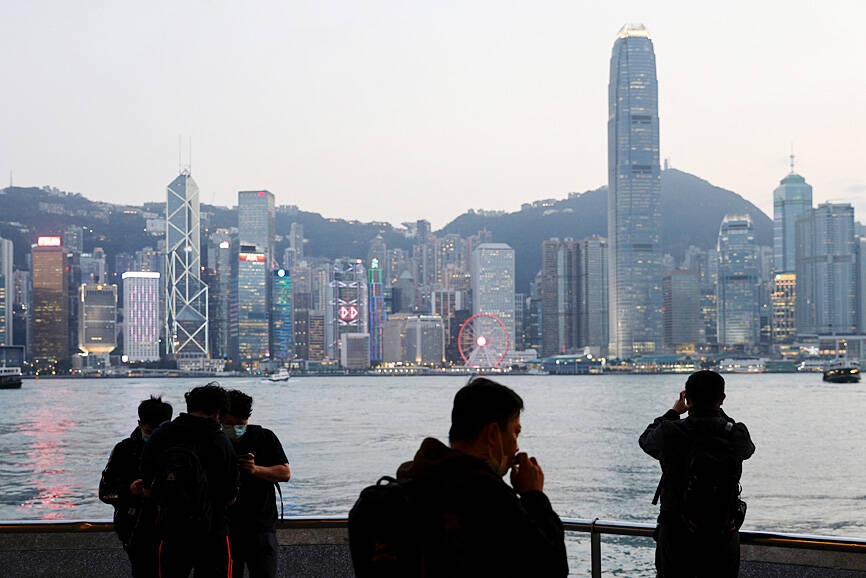The number of Hong Kongers obtaining permanent residency in Taiwan rose 10.5 percent from 2022 to last year, the Mainland Affairs Council (MAC) said.
Last year, 1,432 Hong Kongers obtained permanent residency in Taiwan, up from 1,296 in 2022, the council said in a recent report to the Legislative Yuan, after opposition lawmakers questioned whether the government had made the process more difficult by raising the threshold for Hong Kongers to obtain residency.
Residency applications under general immigration or humanitarian reasons are separate mechanisms that are handled independently, the council said, adding that the government is continuing to implement the Hong Kong Humanitarian Aid Project.

Photo: Reuters
The government welcomes talented people from Hong Kong and Macau who can contribute to the country’s development to apply through general immigration, it said.
Authorities have reported many applicants that contravened immigration laws and regulations, such as those applying for immigration as an investor without investing, applying as a professional worker without using their reported expertise or applying for family-based residency without family sponsors, it said.
Some fraudulent immigration applications have also been discovered, against which the government would take corrective measures, it said.
Applicants who meet the residency requirements stipulated in the Regulations Governing Permits for Hong Kong and Macau Residents Entering the Taiwan Area and Setting Up Residence or Registered Permanent Residence in the Republic of China (香港澳門居民進入台灣地區及居留定居許可辦法) and are deemed to pose no national security risk would be granted residency, the MAC said.
If applications raise concerns or the documents submitted are incomplete, authorities would give the applicants six months to one year to submit additional information or documents, it said.
The cases would be provided with a notice that clearly states the information or documents that should be supplemented, it said, adding that authorities would respond to any further inquiries from applicants.
Providing a grace period for applicants is an approach based on humanity and goodwill, rather than an attempt to delay the review process, the MAC said.
The council is striving to coordinate agencies on establishing review criteria and protocols for handling residency applications from Hong Kongers and Macanese, it said.
In the past year, many Hong Kongers have spoken positively about the government’s assistance in their resettlement, it said.
Some YouTubers who recently moved from Hong Kong made videos to help people better understand the government’s stance and practices, the MAC said.
The political situation in Hong Kong has changed dramatically in the past few years, which also affects its population, at least one-fifth of which is originally from mainland China, it said.
The government would review residency applications cautiously to ensure national security and long-term social stability, it said.
The council would continue assisting agencies with residency application reviews as well as with bridging the gap between the cultures of Taiwan and Hong Kong to help Hong Kongers residing in Taiwan better adapt to their lives in the nation as soon as possible, it said.

SHIPS, TRAINS AND AUTOMOBILES: The ministry has announced changes to varied transportation industries taking effect soon, with a number of effects for passengers Beginning next month, the post office is canceling signature upon delivery and written inquiry services for international registered small packets in accordance with the new policy of the Universal Postal Union, the Ministry of Transportation and Communications said yesterday. The new policy does not apply to packets that are to be delivered to China, the ministry said. Senders of international registered small packets would receive a NT$10 rebate on postage if the packets are sent from Jan. 1 to March 31, it added. The ministry said that three other policies are also scheduled to take effect next month. International cruise ship operators

HORROR STORIES: One victim recounted not realizing they had been stabbed and seeing people bleeding, while another recalled breaking down in tears after fleeing A man on Friday died after he tried to fight the knife-wielding suspect who went on a stabbing spree near two of Taipei’s busiest metro stations, Taipei Mayor Chiang Wan-an (蔣萬安) said. The 57-year-old man, identified by his family name, Yu (余), encountered the suspect at Exit M7 of Taipei Main Station and immediately tried to stop him, but was fatally wounded and later died, Chiang said, calling the incident “heartbreaking.” Yu’s family would receive at least NT$5 million (US$158,584) in compensation through the Taipei Rapid Transit Corp’s (TRTC) insurance coverage, he said after convening an emergency security response meeting yesterday morning. National

PLANNED: The suspect visited the crime scene before the killings, seeking information on how to access the roof, and had extensively researched a 2014 stabbing incident The suspect in a stabbing attack that killed three people and injured 11 in Taipei on Friday had planned the assault and set fires at other locations earlier in the day, law enforcement officials said yesterday. National Police Agency (NPA) Director-General Chang Jung-hsin (張榮興) said the suspect, a 27-year-old man named Chang Wen (張文), began the attacks at 3:40pm, first setting off smoke bombs on a road, damaging cars and motorbikes. Earlier, Chang Wen set fire to a rental room where he was staying on Gongyuan Road in Zhongzheng District (中正), Chang Jung-hsin said. The suspect later threw smoke grenades near two exits

The Forestry and Nature Conservation Agency yesterday launched a gift box to market honey “certified by a Formosan black bear” in appreciation of a beekeeper’s amicable interaction with a honey-thieving bear. Beekeeper Chih Ming-chen (池明鎮) in January inspected his bee farm in Hualien County’s Jhuosi Township (卓溪) and found that more than 20 beehives had been destroyed and many hives were eaten, with bear droppings and paw prints near the destroyed hives, the agency said. Chih returned to the farm to move the remaining beehives away that evening when he encountered a Formosan black bear only 20m away, the agency said. The bear